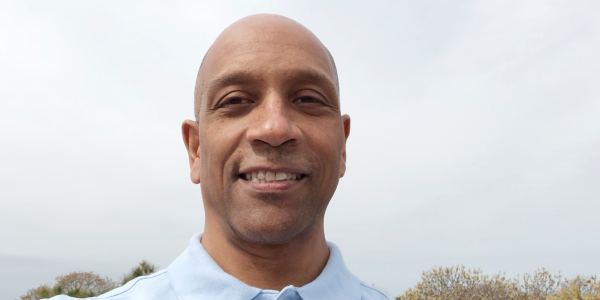NAEYC Member Spotlight: Kevin McGowan

You are here
Kevin McGowan
Assistant Professor of Early Education and Care, Bridgewater State University
As a former Head Start teacher in Washington, DC, Kevin McGowan enjoyed children’s natural curiosity. He also found that he could build on their tendency to ask questions about any and all subjects and engage in one of his top priorities as a teacher in a diverse, urban community: anti-bias education: “It’s crucial, because more and more teachers will find themselves working with children who may not necessarily look like them or come from the same social backgrounds.”
He recalls one group of children that was very curious about body types. A child once approached a peer who was slightly larger than the other children and said, “My mommy said that you are fat.” Kevin made sure he and the children had a discussion about how language can make others feel, using puppets to demonstrate emotions. Kevin also had a conversation with the mother of the child who had made the comment, asking her to be aware of how she talks about people’s differences in front of her daughter. “If we ignore [children’s comments] and just say to them, ‘Oh that’s just not what we say or what we do,’ we kind of leave them to their own devices, coming up with solutions themselves without guidance and facilitation.” Kevin believes that if these conversations start early, children are more likely to grow up valuing diversity.
To address narrow concepts of gender, Kevin has also talked with fathers who were not happy that their sons were playing in the dramatic play area while wearing dresses or aprons—conversations that were not always successful. As someone rewriting gender norms himself (as a male early childhood educator), Kevin knows that there is a lot of work left to do to end gender biases. “We learn from the very beginning that we put little girls in pink and we put little boys in blue. I think we have to consciously disrupt these strong notions around such rigid gender roles.” To intentionally teach about gender, Kevin carefully selected professionals to visit his class on Community Helpers day. He invited women working in jobs traditionally considered to be for men and men working in jobs traditionally considered to be for women—for instance, a female police officer and a male nurse—to show children that in their current activities and future career choices, they can follow their interests.
Currently a college professor preparing future early childhood educators, Kevin thinks it’s imperative to discuss anti-bias education with his students because they will soon become important figures in the lives of young children. At the heart of his approach is a simple message from Anti-Bias Education for Young Children and Ourselves: “We’re all the same and we’re all different.” Kevin finds this powerful because, as he says, “It disrupts the notion that we’re all colorblind.”
When he isn’t teaching, Kevin enjoys taking walks with his partner of more than 25 years and their dogs. He also loves connecting with his 90-year-old father and 86-year-old mother in Houston. He attempts to balance his personal and professional lives, making sure to take care of himself physically, spiritually, and mentally.
Asked why he wanted to become a teacher, Kevin says that, when he was in college, he actually talked himself out of it, choosing instead to enter the premedical track. He believes he bought into some of the gender bias surrounding early childhood education, thinking, “A man doesn’t really do this; I need to pick another profession more geared toward what men do.” After some intense self-reflection, though, Kevin changed his major and started his career as an early childhood educator. As an educator, Kevin has worn many hats—teacher, instructional coach, education manager, and assistant professor—but he still sees being a preschool teacher as his most important role.
Visit NAEYC.org/get-involved/membership/spotlight for more information on how to:
Share your Story Answer a few questions to tell us about your work with young children and what NAEYC membership means to you.
Nominate a Member Share why an NAEYC member you know should be recognized for his or her work with young children.